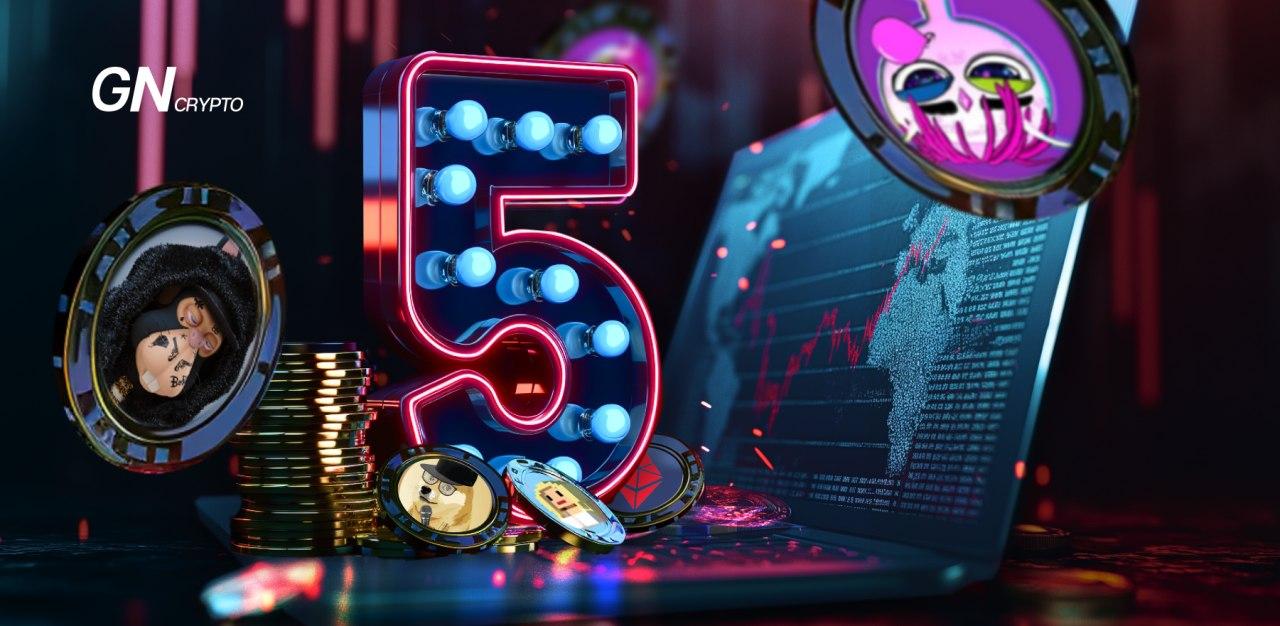Top 5 Celebrity Crypto Projects That Failed

It’s rare to find a celebrity-launched crypto project that achieves success. Most of these ventures collapse within hours or days, and they often serve as dubious methods of monetizing fame.
On this page
From late May to early June 2024, celebrities like Iggy Azalea (MOTHER), Caitlyn Jenner (JENNER), and Rich the Kid (RICH) launched their own meme coins. Many crypto users (especially newcomers) poured their investments into these projects, driven by the stars' influence.
This article will cover five celebrities associated with failed crypto ventures.
Davido
In 2021, Nigerian rapper Davido actively shilled the meme coin RapDoge. With over 9 million followers on X (formerly Twitter) at the time, he encouraged his audience to buy the token with posts on his page, which led to the asset doubling in value before quickly falling back to its original price—a classic Pump&Dump scenario.
Despite the backlash, Davido continued to engage in similar ventures. Over the next three years, he launched six more projects. His latest token named DAVIDO was released in late May 2024.
According to LookOnchain, Davido sold his tokens, earning 2,783 SOL (about $450,000) just 11 hours after its launch, effectively using his fan base for liquidity.
Davido’s inclination towards exploiting financial opportunities has been evident long before his involvement in the crypto industry. He had previously promoted a scam project called Racksterli—a financial pyramid scheme similar to MMM.
Adin Ross
In 2021, the well-known streamer and influencer Adin Ross faced allegations of promoting the MILF scam token. It is reported that Ross was compensated around $200,000 for advertising the project.
During a live stream, Ross demonstrated how to purchase the MILF token, effectively encouraging his approximately 75,000 viewers at the time to do the same. Shortly after, the token crashed, and the project was labeled a classic pump-and-dump scheme.
Facing criticism from fans, Ross asserted that he was not directly connected to the project—a claim that is likely true. He also expressed his hope that none of his viewers bought the token. According to him, no one bought the token as a result of his promotion, leading to its drop.
Contrary to Ross's claims, the situation unfolded quite differently: his promotion was indeed effective, causing the trading volume of the MILF token to surge sevenfold to $17.5 million.
Trading Volume of the MILF Token at the Time of the Incident. Source: x.com
The trading sparked by Ross's fans was quickly met with heavy selling by the token's creators. According to various estimates, the MILF founders managed to earn around $1 million from this scheme.
Floyd Mayweather Jr
Throughout his professional boxing career, Floyd Mayweather fought in 50 bouts without a single loss and achieved 27 knockouts. In 2017, he retired and shifted his focus to the info business: appearing on podcasts, starring in commercials, and endorsing dubious crypto projects.
Mayweather actively promoted several crypto ventures on his social media accounts, including Centra ICO, EMAX coin, Bored Bunny NFTs, Floyd's World, and Mayweverse. By June 2024, all of these projects had been abandoned, and their associated assets had plummeted in value.
Following the launch of Mayweverse in 2022, renowned blockchain researcher ZachXBT investigated Mayweather's involvement in crypto. He identified a cluster of blockchain addresses that were linked not only to Mayweverse but also to previous fraudulent projects associated with Mayweather.
Crypto Wallet Cluster Linked to Mayweather's Scam Projects. Source: x.com
The Mayweverse NFT collection featured 5,000 collectible cards depicting Mayweather in various outfits: a gold chain, a black suit, boxing gloves, and training shorts, among others.
Each NFT was priced at $900. The project held contests for its holders, offering prizes ranging from $5,000 to $30,000, as well as the chance to join Mayweather in an upcoming metaverse called “Floyd's Gym.”
The last update from the project’s account on X was posted on April 18, 2022. The reasons for this long period of inactivity remain unclear (though the reasons can be surmised), as does the actual number of NFTs sold. If all NFTs were distributed, Mayweather's earnings from the project would total $4.5 million.
By June 2024, this project too had been abandoned. There is a collection on OpenSea named Mayweverse By Floyd, but it’s uncertain whether it truly belongs to Mayweather. It contains 207 NFTs priced at 0.03 ETH (about $100 each), which have not been popular among users: none have been sold in the past 90 days.
Lil Uzi Vert
In September 2021, the crypto community leveled accusations against the well-known American rapper Lil Uzi Vert for promoting a scam project. He actively promoted the Solana-based Eternal Beings NFT collection but deleted all related posts soon after the project’s launch.
The Eternal Beings collection consists of 11,111 NFTs depicting aliens dressed in the rapper's typical style, including tattoos, clothes, and hairstyles. Each NFT was initially offered for minting at 2.5 SOL, valued at approximately $337 at the project's inception.
Eternal Beings NFT Collection. Source: solanart.io
It remains unclear whether Lil Uzi Vert was merely a promotional figure or had a deeper involvement in the project. Regardless, his promotional efforts significantly impacted the price of the NFTs. After he removed his related posts, the tokens fell by half.
When holders of Eternal Beings sought explanations for the rapper’s actions, the project's Discord team only offered defensive and rude responses. For instance, one moderator called the concerned parties “idiots” and urged them not to panic, promising that the floor price would rise.
Regrettably, these promises went unfulfilled. As of May 2024, only two NFTs were sold, each for a mere 0.015 SOL (about $2.5). The project's account on X has been blocked, and Lil Uzi Vert has remained unpunished.
Rich the Kid
In October 2021, another American rapper, Rich the Kid, launched his own NFT collection named after him. The tokens featured images of a wealthy kid (reflecting his stage name, Rich the Kid) in various contexts and attire: with a bicycle against a backdrop of graffiti, with a dog in jail, and with a skateboard in a strip club.
RichKidsOfficial NFT Collection. Source: opensea.io
This collection was launched on Ethereum, with each NFT mint priced at 0.09 ETH (approximately $350). By December 2021, the project's website had shut down, and the floor price of the NFTs had plummeted to 0.004 ETH. Since then, there have been no new posts from the official X account of the collection.
According to various sources, Rich the Kid earned around $2 million from this project. Interestingly, he used 10% of these profits to purchase NFTs from the BAYC and MAYC collections, suggesting a genuine understanding and interest in the NFT market.
Financial Movements After Rich The Kid's NFT Collection Sale. Source: x.com
Furthermore, Rich The Kid collaborated with Raichu, a crypto marketer specializing in launching such projects. He promoted the Ancient Cats Club NFT collection, which eventually turned out to be a scam.
Vitalik Buterin on Celebrity Meme Coins
Vitalik Buterin, the co-founder of Ethereum, asserts that the financialization of meme projects is only justifiable if it benefits society—for instance, by enhancing healthcare, supporting open-source software, or advancing the arts. Financialization as an end goal, he argues, should be distasteful to true enthusiasts.
Buterin identifies three key characteristics that such projects should possess to merit his approval:
- The project must aim to serve a public good rather than merely enrich the celebrity and their early followers.
- It should introduce unique mechanics beyond simple token exchanges.
- The project should have the potential to develop and sustain relevance over a decade.
Buterin emphasizes the importance of creating projects where all participants can feel content with their involvement, even if the tokens themselves do not ultimately succeed.
The content on The Coinomist is for informational purposes only and should not be interpreted as financial advice. While we strive to provide accurate and up-to-date information, we do not guarantee the accuracy, completeness, or reliability of any content. Neither we accept liability for any errors or omissions in the information provided or for any financial losses incurred as a result of relying on this information. Actions based on this content are at your own risk. Always do your own research and consult a professional. See our Terms, Privacy Policy, and Disclaimers for more details.






























